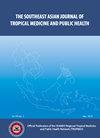The Relationship of Knowledge, Practices, and Culture on Low Coverage of Exclusive Breastfeeding
IF 0.1
4区 医学
Q4 INFECTIOUS DISEASES
Southeast Asian Journal of Tropical Medicine and Public Health
Pub Date : 2023-06-10
DOI:10.9734/ajmah/2023/v21i9850
引用次数: 0
Abstract
Aims: The aims of this study was to analyze the influence of knowledge Practices and,Culture on the low coverage of exclusive breastfeeding. Introduction: Exclusive breastfeeding is breastfeeding as early as possible after delivery, given without schedule, and not given other food even if only water until the baby is six months old. Development Agency of the Indonesian Ministry of Health said Exclusive Breastfeeding in Aceh Province is 41.0%, the coverage of breastfeeding in Aceh Province is very low and has not reached the target set by the Indonesian Ministry of Health, which is 80%. West Aceh's exclusive breastfeeding coverage 44%, exclusive breastfeeding coverage is still far from the target. The Meutulang region for two consecutive years still has the same achievement rate of 13.4%. Study Design: Cross-Sectional Survey approach. Location and Duration of Study: Conducted in December 2022 (15 November-20 Desember) in Meutulang District, West Aceh, Aceh, Indonesia. Methods: The population of all mothers who have babies aged 6-12 months. Sampling by the total sampling method, where all polluters were sampled as many as 44 respondents were. Furthermore, the data were analyzed using univariate and bivariate and then tested with a Simple Linear Regression Model. Results: proved that there is an influence of knowledge, action, and culture on the low coverage of exclusive breastfeeding as evidenced by the correlation value (R) of 0.601 and the value of the coefficient of determination (R²) of 0.464, which means that the influence of the independent variable on the dependent variable is 46.4% where the correlation between the independent and dependent variables is in a strong category with value (Pvalue <0.05). Conclusion: There was an influence of knowledge with value (Pvalue 0.011<0.05), value action (Pvalue 0.028<0.05), and value culture (Pvalue 0.000<0.05) on the low coverage of exclusive breastfeeding. Suggestions: There needs to be more intense socialization and enlightenment by relevant officers in terms of mothers' understanding of exclusive breastfeeding so that mothers consider exclusive breastfeeding more important and can analyze the culture around them to give breast milk to their babies at least until the age of 6 months.纯母乳喂养覆盖率低与知识、实践和文化的关系
目的:本研究的目的是分析知识、实践和文化对纯母乳喂养覆盖率低的影响。简介:纯母乳喂养是在婴儿出生后尽早进行母乳喂养,没有时间表,在婴儿六个月大之前不给其他食物,即使只有水。印度尼西亚卫生部发展署表示,亚齐省的纯母乳喂养覆盖率为41.0%,亚齐省的母乳喂养覆盖率非常低,尚未达到印度尼西亚卫生部设定的80%的目标。西亚齐的纯母乳喂养覆盖率为44%,纯母乳喂养覆盖率仍远未达到目标。梅土郎地区连续两年的完成率仍然保持在13.4%的水平。研究设计:横断面调查方法。研究地点和时间:于2022年12月(11月15日至12月20日)在印度尼西亚亚齐省西亚齐省Meutulang区进行。方法:所有有6-12个月婴儿的母亲。抽样采用总抽样法,对所有污染者抽样,最多抽样44个答复者。此外,采用单变量和双变量分析数据,然后用简单线性回归模型进行检验。结果:证明了知识、行为和文化对纯母乳喂养覆盖率低的影响,相关值(R)为0.601,决定系数(R²)为0.464,即自变量对因变量的影响为46.4%,自变量与因变量之间的相关性处于强值范畴(p值<0.05)。结论:有价值的知识(p值为0.011<0.05)、有价值的行动(p值为0.028<0.05)、有价值的培养(p值为0.000<0.05)对纯母乳喂养覆盖率低有影响。建议:在母亲对纯母乳喂养的认识方面,需要加强相关人员的社会化和启蒙,使母亲更加重视纯母乳喂养,并能分析周围的文化,至少在6个月之前给宝宝喂奶。
本文章由计算机程序翻译,如有差异,请以英文原文为准。
求助全文
约1分钟内获得全文
求助全文
来源期刊

Southeast Asian Journal of Tropical Medicine and Public Health
PUBLIC, ENVIRONMENTAL & OCCUPATIONAL HEALTH-INFECTIOUS DISEASES
CiteScore
0.40
自引率
0.00%
发文量
0
审稿时长
3-8 weeks
期刊介绍:
The SEAMEO* Regional Tropical Medicine and Public Health Project was established in 1967 to help improve the health and standard of living of the peoples of Southeast Asia by pooling manpower resources of the participating SEAMEO member countries in a cooperative endeavor to develop and upgrade the research and training capabilities of the existing facilities in these countries. By promoting effective regional cooperation among the participating national centers, it is hoped to minimize waste in duplication of programs and activities. In 1992 the Project was renamed the SEAMEO Regional Tropical Medicine and Public Health Network.
 求助内容:
求助内容: 应助结果提醒方式:
应助结果提醒方式:


